Vision of the Department
To be a centre of excellence in the field of Electronics and Communication Engineering (ECE) equipped with the state of art technologies to produce highly competent, resourceful, and ethical young professionals who create innovative solutions to the needs of the society and excel in the varied professional trends globally.
Mission of the Department
M1: To impart strong theoretical and experimental fundamentals in electronics and communication engineering that enable students to be competent in the growing technical demands and challenges.
M2: To facilitate appropriate technical exposure on the latest and cutting-edge technological trends through academic and collaborative interactions with industry, academia and research organizations.
M3: To foster an environment of excellence in theoretical and applied research evident through product development, patents, projects, publications in SCI and WOS journals, books and conferences.
M4: To participate in the development of the nation through social and ethical commitments by promising innovation, research and entrepreneurship.
Programme Educational Objectives (PEOs)
PROGRAMME EDUCATIONAL OBJECTIVES (PEOs)
PEO1: Implement the acquired sound technical knowledge in core and specialized subjects of Electronics & Communication Engineering to be creative and innovative in solving engineering problems in the current scenario.
PEO2: Professionally competent with a high degree of employability in National and International Industries with the ability to handle any complicated technical issues.
PEO3: Induce critical thinking with the awareness of recent and future technological developments to contribute effectively towards Research and Development.
PEO4: Inculcate Life-long learning, Collective responsibility, Managerial capabilities and Leadership qualities by adapting to new technologies for societal benefits.
Programme Outcomes (POs) & Programme Specific Outcomes (PSOs)
Programme Outcomes (POs)
PO1: Engineering Knowledge: Apply the knowledge of mathematics, science, engineering fundamentals, and an engineering specialization to the solution of complex engineering problems.
PO2: Problem Analysis: Identity, formulate, research literature, and analyze complex engineering problems reaching substantiated conclusions using first principles of mathematics, natural sciences, and engineering sciences.
PO3: Design/Development of Solutions: Design solutions for complex engineering problems and design system components or processes that meet the specified needs with appropriate consideration for the public health and safety, and the cultural, societal, and environmental considerations.
PO4: Conduct Investigations of Complex Problems: Use research-based knowledge and research methods including design of experiments, analysis and interpretation of data, and synthesis of the information to provide valid conclusions.
PO5: Modern Tool Usage: Create, select, and apply appropriate techniques, resources, and modern engineering and IT tools including prediction and modeling to complex engineering activities with an understanding of the limitations.
PO6: The engineer and Society: Apply reasoning informed by the contextual knowledge to assess societal, health, safety, legal and cultural issues and the consequent responsibilities relevant to the professional engineering practice.
PO7: Environment and sustainability: Understand the impact of the professional engineering solutions in societal and environmental contexts, and demonstrate the knowledge of, and need for sustainable development.
PO8: Ethics: Apply ethical principles and commit to professional ethics and responsibilities and norms of the engineering practice.
PO9: Individual and team work: Function effectively as an individual, and as a member or leader in diverse teams, and in multidisciplinary settings.
PO10: Communication: Communicate effectively on complex engineering activities with the engineering community and with society at large, such as, being able to comprehend and write effective reports and design documentation, make effective presentations, and give and receive clear instructions.
PO11: Project management and finance: Demonstrate knowledge and understanding of the engineering and management principles and apply these to one’s own work, as a member and leader in a team, to manage projects and in multidisciplinary environments.
PO12: Life-long learning: Recognize the need for, and have the preparation and ability to engage in independent and life-long learning in the broadest context of technological change.
Programme Specific Outcomes (PSOs)
PSO1: Design and analyze the concepts and applications in the field of Communication, Cognitive Networks, Signal & Image processing, Embedded systems, Data Science and Artificial Intelligence to find solutions to the real-world problems.
PSO2: Demonstrate the acquired professional and competitive skills for successful Carrier, demonstrating the practice of Professional Ethics and the concerns for Social and Environmental impact technologies.
Curriculum & Syllabus 2022
CURRICULUM & SYLLABUS
MINIMUM CREDITS TO BE EARNED: 170
| Category | SEMESTER I | Hours/Weeks | Maximum Marks | |||||||
|---|---|---|---|---|---|---|---|---|---|---|
| Course Title | Lecture | Tutorial | Practical | Credits | CA | SEE | Total | |||
| BSC | Chemistry | 3 | - | - | 3 | 40 | 60 | 100 | ||
| BSC | Mathematics-I (Calculus and Linear Algebra) | 3 | 1 | - | 4 | 40 | 60 | 100 | ||
| ESC | Programming for Problem solving | 3 | - | - | 3 | 40 | 60 | 100 | ||
| ESC | Basic Civil and Mechanical Engineering | 3 | - | - | 3 | 40 | 60 | 100 | ||
| ESC | Workshop and Manufacturing Practices | 1 | - | 4 | 3 | 40 | 60 | 100 | ||
| BSC | Chemistry Laboratory | - | - | 2 | 1 | 40 | 60 | 100 | ||
| ESC | Programming for problem solving Laboratory | - | - | 2 | 1 | 40 | 60 | 100 | ||
| MC | Student Induction Program | - | - | - | - | - | - | - | ||
| MC | Universal Human Values: Understanding Harmony | 2 | - | - | - | - | - | 100 | ||
| 15 | 1 | 8 | 18 | |||||||
Curriculum & Syllabus 2018
CURRICULUM & SYLLABUS
MINIMUM CREDITS TO BE EARNED: 170
| SEMESTER I | Hours/Weeks | Maximum Marks | ||||||
|---|---|---|---|---|---|---|---|---|
| Category | Course Title | Lecture | Tutorial | Practical | Credits | CA | SEE | Total |
| BS | Chemistry | 3 | 1 | 0 | 4 | 40 | 60 | 100 |
| BS | Mathematics – I (Calculus and Linear Algebra) | 3 | 1 | 0 | 4 | 40 | 60 | 100 |
| ES | Programming for Problem solving | 3 | 0 | 0 | 3 | 40 | 60 | 100 |
| BS | Chemistry Laboratory | 1 | 0 | 3 | 2 | 40 | 60 | 100 |
| ES | Programming for problem solving Laboratory | 1 | 0 | 3 | 2 | 40 | 60 | 100 |
| ES | Workshop/Manufacturing Practices | 1 | 0 | 4 | 3 | 40 | 60 | 100 |
| MC | Constitution of India | 2 | 0 | 0 | 0 | - | - | - |
| 14 | 2 | 10 | 18 | |||||
Eligibility Criteria
| Program | Program Duration (Year) | Program Duration (Year)Eligibility | Criteria for Merit |
|---|---|---|---|
| B.Tech. Electronics & Communication Engineering | 4 Years (8 Semesters) | "First Year: Passed 10+2 examination with Physics/ Mathematics/ Chemistry/ Computer Science/ Electronics/ Information Technology/ Biology/ Informatics Practices/ Biotechnology/ Technical Vocational subject/ Agriculture/ Engineering Graphics/ Business Studies/ Entrepreneurship as per table 8.4 Agriculture stream (for Agriculture Engineering) Obtained at least 45% marks (40% marks in case of candidates belonging to reserved category) in the above subjects taken together. OR Passed D.Voc. Stream in the same or allied sector. (The Universities will offer suitable bridge courses such as Mathematics, Physics, Engineering drawing, etc., for the students coming from diverse backgrounds to prepare Level playing field and desired learning outcomes of the programme) Lateral Entry (to Second Year) Passed Minimum THREE years / TWO years (Lateral Entry) Diploma examination with at least 45% marks (40% marks in case of candidates belonging to reserved category) in ANY branch of Engineering and Technology. OR Passed B.Sc. Degree from a recognized University as defined by UGC, with at least 45% marks (40% marks in case of candidates belonging to reserved category) and passed 10+2 examination with Mathematics as a subject. OR Passed B.Voc/3-year D.Voc. Stream in the same or allied sector. (The Universities will offer suitable bridge courses such as Mathematics, Physics, Engineering drawing, etc., for the students coming from diverse backgrounds to achieve desired learning outcomes of the programme)" | " Merit based on Vels Entrance Examination and percentage of mark secured in the qualifying examination" |
Career Prospects
CAREER PROSPECTS
- AI Developer/ AI Engineer
- Communication Engineer
- Design Engineer
- Desktop Support Engineer
- Embedded Software Engineer
- Hardware Design Engineer & Developer
- Network Engineer
- Software Engineer
- System Analyst & Engineer
- Research and Development Engineering
Alumni Testimonials

If you have dreams and are willing to trust your professors to help you achieve them, VISTAS is the place for you. I always feel very happy when it comes to talking about my parent university. I love the curriculum, world-class infrastructure, environment, and other facilities that make you ready for the professional world. It is best in academics, extra-curricular activities, faculty members who keep motivating us in every manner for making us successful in life. The systems are very strict which is good for the students. Career becomes successful at VISTAS, from where I have started my profession as a Big Data Developer at Cognizant Technology Solutions through campus placement, and currently promoted to Quality Assurance Analyst at Cognizant Technology Solutions, Lake Oswego, Oregon.
KASA ANOOP (B.E. Electronics and Communication Engineering)
Quality Assurance Analyst at Cognizant Technology Solutions, Lake Oswego, Oregon.
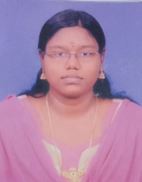
My BE-ECE program with VISTAS was one in all the most effective experience in life. VISTAS gave me a platform that I will cherish always. I was really excited to study at VISTAS. I like my professors and mentors. They always help me when I have questions. We use lots of technologies in our classes during studying. The Professors are very helpful; they always want to help us with our problems. In addition, this college gives me a lot of opportunities both technically and non technically. Thanks to management for wonderful placement facilities through which I have been placed in HCL Technologies as a software programmer. The infrastructure and facilities provided were extremely good at VISTAS.. I presently feel happy being the alumni of VISTAS, Department of ECE.
POORNIMA RAJAM. R (B.E. Electronics and Communication Engineering)
HCL Technologies as a software programmer
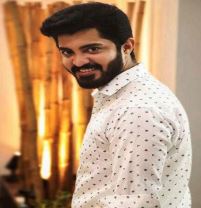
My journey at VISTAS has been absolutely amazing and the college faculty and administration have supported me and my endeavors throughout. The institution regularly organizes workshops and competitions to help students learn new skills. The college also organizes industrial tour and field trips on a yearly basis.. The trip allowed me to expand my intellectual horizon. I wanted to focus more on research in my final year and the college administration went above and beyond to make sure I had what I needed. The teachers here are beyond amazing. I usually ask them a lot of questions regarding my projects and research and they’ve always helped me out. The administration provided an excellent infrastructure and lab facilities which is something that you don’t see a lot in most colleges. The support I received from the college allowed me to explore various fields and then choose one that I liked, of which currently I am an actor in Tamil and Malayalam cinemas.
ASHISH CHAKKARAVARTHY (B.E. Electronics and Communication Engineering)
Actor in Tamil and Malayalam cinemas

Choosing VISTAS for my graduation had been a congenial decision for me as this university keeps on providing new
opportunities each day to augment knowledge and interest. The learner centric environment crafted here not only trained us in the academic curriculum but also motivated us. An exposure to host international tech and innovation competitions inspired us to expand our horizon of knowledge. My faculties made me feel at home as I was from Andamans. I’m privileged to say that I’m a part of VISTAS family.
SARANYA N (B.E. Electronics and Communication Engineering)
SENIOR EXECUTIVE HR - TVS ELECTRONICS LTD

My B.E program with VISTAS- ECE was one of the best experiences in my life. It was my immense luck and fortune to the part of VISTAS where i can grow. The entire faculty and department leaves no stone unturned to shape one’s future. My four years at VISTAS have been a wonderful experience of learning with prolific exposure outside.Huge respect, love and devotion for entire faculty members and department .Faculty contributes significantly to your knowledge base at VISTAS. Through campus, I was placed at TATA COMMUNICATIONS, a dream company of mine as a “Network Engineer”. Thanks to the management and all my faculties for rendering me the untiring guidance. It is my privilege to say proudly that I have been appointed as one of the member in Board of Studies, VISTAS, ECE. I owe my success to “VISTAS” and presently feel proud of being the alumni of VISTAS, Department of ECE. It’s their efforts that make me to count myself into better professionals
SUPRAJA .S (B.E. Electronics and Communication Engineering)
Network Engineer -TATA COMMUNICATIONS
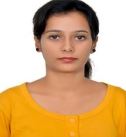
I Shalni Kumari would like to express my sincere gratitude to VISTAS for helping me at each and every step to achieve my degree. The institute provided me the best platform and infrastructure to excel in my carrier interest. They care about how the student is doing within the course and whether we understand, rather than just giving out information and letting the students absorb it however they want. While the placement training helped me enhance my soft skills which made me standout from others. It was very helpful in achieving my career goal and convert my endeavours into real time world. I had a great time at VISTAS. The expert faculty made me Industry ready. I am very thankful to the faculty for their endless support in my BE journey.
SHALNI KUMARI (B.E. Electronics and Communication Engineering)
CAPGEMINI
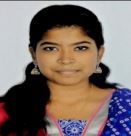
My BE-ECE program with VISTAS was one of the finest experience in my professional career. The curriculum has been well structured to suit the relevant industry needs. This makes the outgoing students industry ready. The infrastructure facilities and the faculty are excellent in grooming the budding minds. Along with academics a lot of different activities on campus like symposium, inter-college techno fest, industrial visits to well reputed and established organizations sharped my thinking skills with a wider knowledge across all fields for a holistic and professional development. It was a vibrant campus for co-curricular & extra-curricular activities to bring out the in-born and inherited talents. With the enriched knowledge of the institute I have been successfully placed with Amazon Development Center, Chennai.
JESSICCA VALENTINA (B.E. Electronics and Communication Engineering)
AMAZON DEVELOPMENT CENTER
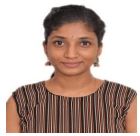
I came to know about VISTAS through my friends and decided to join here for my further education. Taking up engineering here was one of the finest decisions. All the 4 years I was able to actively participate in all kinds of educational and extracurricular activities. VISTAS never failed to encourage their students in every way, either being studies or cultural or sports. Everyone gets equal opportunity to showcase their talents and skills. My mentors and professors were very supportive and always enlighten us on new areas and technologies. The vast experience I gained by studying here helped me gain many skills, develop a better personality and build a foundation to my career. I can always proudly say that I am a VISTAS passed out. Thanks to my department and thanks to VISTAS.
RANJANA RAJAGOPAL (B.E. Electronics and Communication Engineering)
Major Research Areas
Major Research Areas
- 5G Networks & Communication
- Bio Signal and Medical Image processing
- Digital Image & Signal Processing
- Embedded Robotics
- EMI and EMC Studies
- Internet of Things
- Machine Learning & Data Science
- Medical Informatics
- Underwater Communication and Networks
- Wireless Communication Networks
Sponsored Research/Consultancy
| Department of ECE-Sponsored Research / Consultancy | ||||||
|---|---|---|---|---|---|---|
| S. No | Name of Faculty | Project Title | Research/ Consultancy | Funding Agencies | Grant Received | Duration |
| 1 | Dr. S. Jerritta & Dr. V. Rajendran | Real Time Identification and Management of Workplace Stressors in Submariners using Physiological and Behavioral Measures, 2023 | Research | Deep Ocean Mission, Ministry of Earth Sciences-MEOS | Rs. 34,14,000.00 | 2 Years (Ongoing) |
| 2 | Dr. V. Rajendran | Design a prototype configuration model for the vessel tracking system for the benefit of the fishermen community and extend the configuration to the Tamil Nadu coastline from Chennai to Kanyakumari | Research | Department of Science and Technology/ State Science and Technology Program | Rs.99,36,800 | 3 Years (Completed) |
| 3 | Dr. V. Rajendran | Feasibility study on Regression/classification by mining RF radar data using Unsupervised Learning process leading to identification of Intruders | Consultancy | BHAVINI, Kalpakkam | Rs. 1,27,455.00 | 8 Months (Completed) |
| 4 | Dr. M. Meena | Cognitive home automation system with sensor network and its implementation using FPGA controller | Research | Tamil Nadu State Council For Science and Technology (TNSCST) | Rs. 7,500 | 6 Months (Completed) |
Fee Structure
| Tuition Fee 2024 - 2025 (Per Sem) | Other Fee (Per Sem) | Total Fee 2024 - 2025 (Per Sem) |
|---|---|---|
| 42,000 | 33,000 | 75,000 |
Professional Activities
List of Events Organized by the Department From 2019-Present
Faculty of the Department
| Sl. No. | Name of the Faculty | Designation | Educational Qualification | Area of Specialization | Experience in Years | Vidwan ID | Photos |
|---|---|---|---|---|---|---|---|
| 1 | Dr. V. Rajendran | Professor & Director | M.Tech., Ph.D | Systems and Signals, Underwater Electronics, Marine Instrumentation, Underwater signal processing, Ocean Acoustics, Wireless Network & Data Science and Analytics | 37 Years | 290838 | 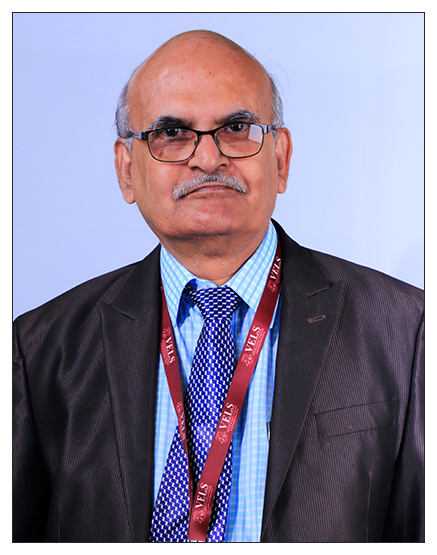 |
| 2 | Dr. Jerritta.S | Professor & HoD | M.E., Ph.D | Psychophysiology, Biomedical Signal and Image Processing, Time Frequency Analysis of time series, Artificial Intelligence & Machine Learning | 17.5 Years | 173520 | 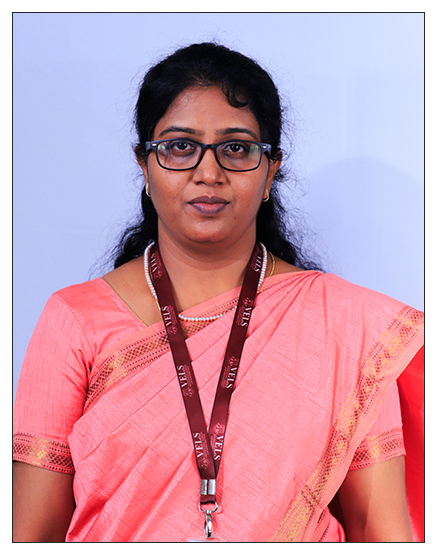 |
| 3 | Dr. Vijayalakshmi.P | Associate Professor | M.E., Ph.D | Underwater Communication and Networking, Machine Learning | 17 Years | 232580 | 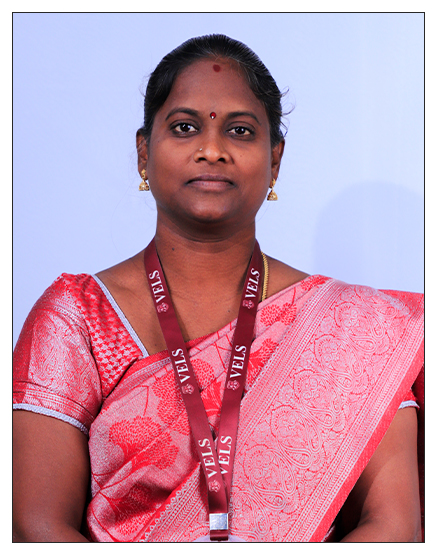 |
| 4 | Dr. M. Meena | Associate Professor | M.E., Ph.D | Wireless Networks - Cognitive radio | 13 Years | 232479 | 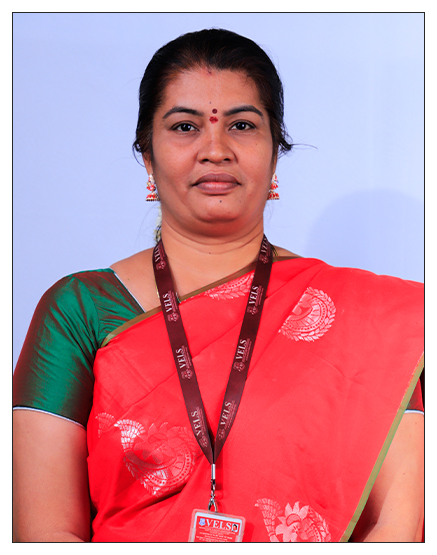 |
| 5 | Dr. G.R. Jothilakshmi | Professor | M.E., Ph.D | Medical Image Processing | 25 Years | 232524 | 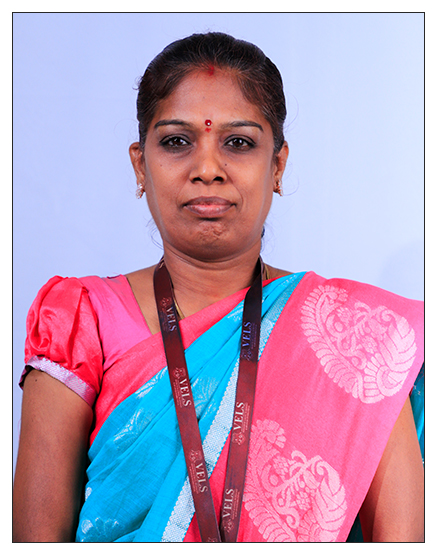 |
| 6 | Dr. T. Jaya | Associate Professor | M.E.,Ph.D | Wireless Networking, Underwater Communication | 12 Years | 290166 | 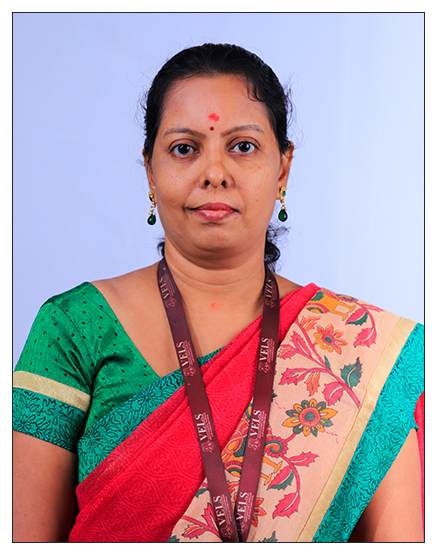 |
| 7 | Dr. Arul Stephen.C | Assistant Professor | M.E., Ph.D | Wireless Sensor Networks and Communication | 10 Years | 250052 | 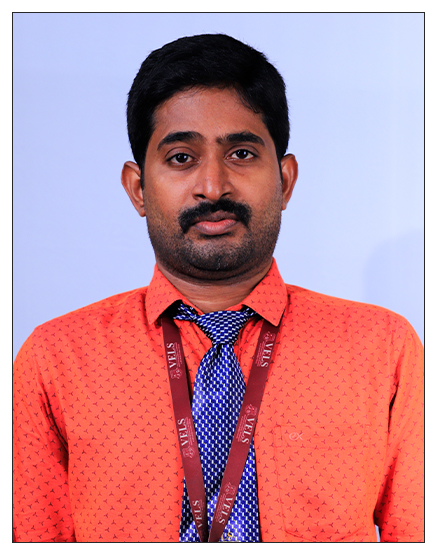 |
| 8 | Dr. M. Monisha | Assistant Professor | M.E., Ph.D | Digital Communication, Wireless Networks & Cognitive Radio Networks | 8 Years | 232464 | 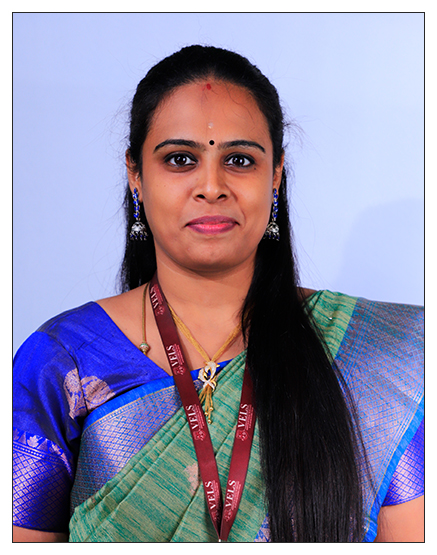 |
| 9 | Dr. Kumudham. R | Associate Professor | M.E., Ph.D | Image Processing and Electromagnetics | 9.6 Years | 173380 | 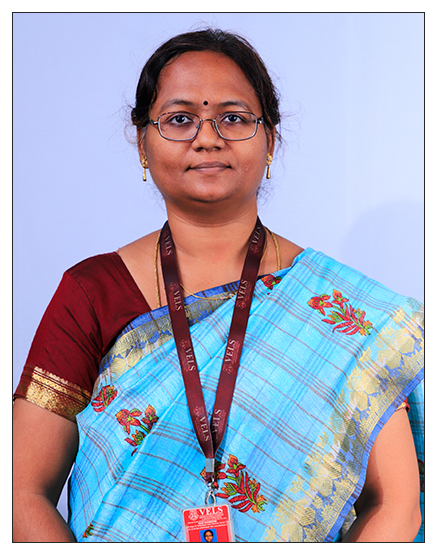 |
| 10 | Dr. C. Sharanya | Assistant Professor | M.E., Ph.D | Digital Electronics, Wireless Networks & Cognitive Radio Networks | 8.5 Years | 232683 | 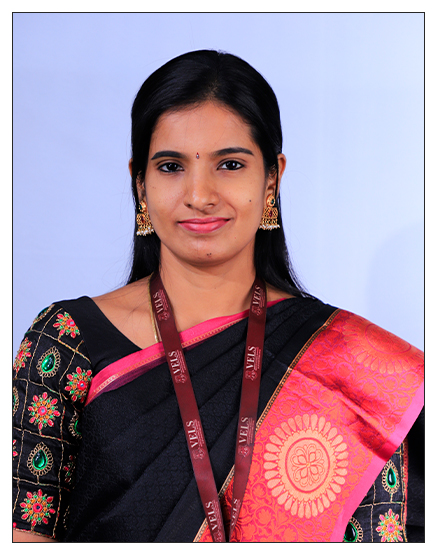 |
| 11 | Dr. A. Vijayalakshmi | Professor | M.E., Ph.D | Wireless Sensor Networks, Deep learning, Data Analysis and Secured Communication, IoT and Embedded Systems | 21 Years | 232640 | 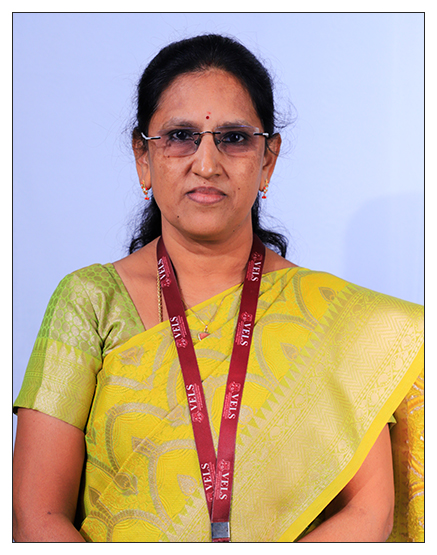 |
| 12 | Mr. J.Antony Veera Puthira Raja | Assistant Professor | M.E., MBA, (Ph.D) | Wireless Network & Data Science and Analytics | 10 | 497452 | 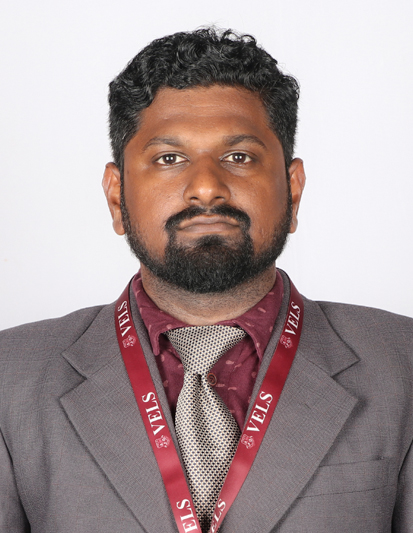 |
| 13 | Dr. Madona B Sahaai | Assistant Professor | M.Tech., Ph.D | Medical Image Processing | 4 | 250933 | 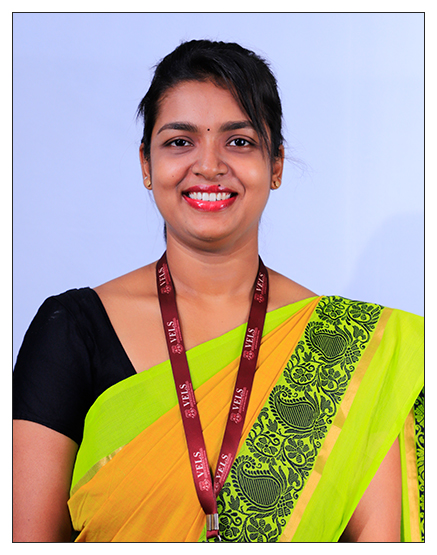 |
 CHAT WITH A STUDENT
CHAT WITH A STUDENT